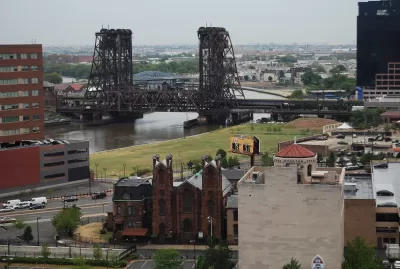In New Jersey, a cap-and-trade system existed for two decades and appeared to just perpetuate housing and social inequities. But now legislators and researchers are considering it again.

Kriston Capps writes that some New Jersey state legislators have proposed bringing back a cap-and-trade system for affordable housing that was in place from 1988 to 2008. In response to the Mount Laurel Doctrine, which required municipalities to produce affordable housing, New Jersey established new fair housing rules, including the cap-and-trade system. It permitted a municipality to pay another city or town to take on half of its affordable housing obligation.
This system undermined much of what the Mount Laurel Doctrine sought to achieve. Wealthy cities sent housing elsewhere, and those sending cities also saw huge gains in employment while the receiving ones lost jobs.
A reasonable conclusion is that bringing such a system back would just exacerbate inequality. "Cap and trade, after all, would seem to give rich communities an out on fair housing. This could reward the nation’s worst impulses, since opposition to low-income housing is often rooted in racism," notes Capps.
But Robert Wassmer and Imaez Wahid published a paper last year suggesting that a version of cap and trade might be a way to more readily reveal the underlying prejudices about affordable housing driving such a program in the first place:
Cap and trade between communities with similar outlooks and incomes would look different. Affluent NIMBYs would have to find other affluent NIMBYs and reach a deal, Wassmer says. This might shed light on the irrational beliefs (racism and classism) behind the rational motivations (perceived home value) underlying NIMBYism. Wassmer says that he predicts that in a true neighborhood cap and trade, no trading would happen at all.
They say that homeowners’ perceptions about the effects of affordable housing on property values are not totally irrational and a relationship does exist between racial demographics and home sales prices, even if other quality of life measures in a neighborhood do not change.
"Low-income housing doesn’t acidify the oceans or exacerbate forest fires. Unlike with climate change, there isn’t a NIMBY problem to solve except perception," notes Capps. Wassmer and Imaez suggest that putting a dollar value on these NIMBY perceptions and forcing cities to pay up could be an effective way to make communities rethink their views on affordable housing.
FULL STORY: Putting a Price on NIMBYism

Planetizen Federal Action Tracker
A weekly monitor of how Trump’s orders and actions are impacting planners and planning in America.

Congressman Proposes Bill to Rename DC Metro “Trump Train”
The Make Autorail Great Again Act would withhold federal funding to the system until the Washington Metropolitan Area Transit Authority (WMATA), rebrands as the Washington Metropolitan Authority for Greater Access (WMAGA).

The Simple Legislative Tool Transforming Vacant Downtowns
In California, Michigan and Georgia, an easy win is bringing dollars — and delight — back to city centers.

Demise of Entertainment Industry Mirrors Demise of Housing in LA
Making movies has a lot in common with developing real estate: producers = developers; screenwriters = architects; directors = general contractors. The similarities are more than trivial. Both industries are now hurting in L.A.

How Public Spaces Exclude Teen Girls
Adolescent girls face unique challenges and concerns when navigating public spaces. We can design cities with their needs in mind.

Proposed Ohio Budget Preserves Housing Trust Fund
The Senate-approved budget also creates two new programs aimed at encouraging housing construction.
Urban Design for Planners 1: Software Tools
This six-course series explores essential urban design concepts using open source software and equips planners with the tools they need to participate fully in the urban design process.
Planning for Universal Design
Learn the tools for implementing Universal Design in planning regulations.
Smith Gee Studio
City of Charlotte
City of Camden Redevelopment Agency
City of Astoria
Transportation Research & Education Center (TREC) at Portland State University
US High Speed Rail Association
City of Camden Redevelopment Agency
Municipality of Princeton (NJ)




























